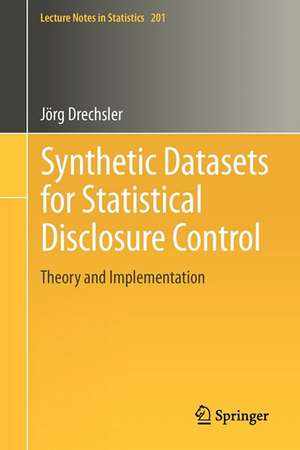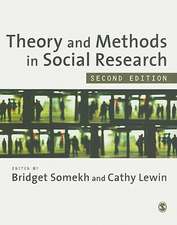Synthetic Datasets for Statistical Disclosure Control: Theory and Implementation: Lecture Notes in Statistics, cartea 201
Autor Jörg Drechsleren Limba Engleză Paperback – 29 iun 2011
Each chapter is dedicated to one approach, first describing the general concept followed by a detailed application to a real dataset providing useful guidelines on how to implement the theory in practice.
The discussed multiple imputation approaches include imputation for nonresponse, generating fully synthetic datasets, generating partially synthetic datasets, generating synthetic datasets when the original data is subject to nonresponse, and a two-stage imputation approach that helps to better address the omnipresent trade-off between analytical validity and the risk of disclosure.
The book concludes with a glimpse into the future of synthetic datasets, discussing the potential benefits and possible obstacles of the approach and ways to address the concerns of data users and their understandable discomfort with using data that doesn’t consist only of the originally collected values.
The book is intended for researchers and practitioners alike. It helps the researcher to find the state of the art in synthetic data summarized in one book with full reference to all relevant papers on the topic. But it is also useful for the practitioner at the statistical agency who is considering the synthetic data approach for data dissemination in the future and wants to get familiar with the topic.
Din seria Lecture Notes in Statistics
- 15%
 Preț: 631.86 lei
Preț: 631.86 lei - 17%
 Preț: 490.19 lei
Preț: 490.19 lei - 17%
 Preț: 460.28 lei
Preț: 460.28 lei - 18%
 Preț: 945.92 lei
Preț: 945.92 lei - 18%
 Preț: 1007.35 lei
Preț: 1007.35 lei - 18%
 Preț: 1231.47 lei
Preț: 1231.47 lei -
 Preț: 383.33 lei
Preț: 383.33 lei - 15%
 Preț: 640.71 lei
Preț: 640.71 lei - 15%
 Preț: 658.88 lei
Preț: 658.88 lei -
 Preț: 436.14 lei
Preț: 436.14 lei - 20%
 Preț: 561.42 lei
Preț: 561.42 lei - 15%
 Preț: 639.59 lei
Preț: 639.59 lei - 15%
 Preț: 633.53 lei
Preț: 633.53 lei - 18%
 Preț: 943.25 lei
Preț: 943.25 lei - 15%
 Preț: 641.38 lei
Preț: 641.38 lei - 18%
 Preț: 995.97 lei
Preț: 995.97 lei - 18%
 Preț: 943.25 lei
Preț: 943.25 lei - 15%
 Preț: 643.00 lei
Preț: 643.00 lei - 18%
 Preț: 947.18 lei
Preț: 947.18 lei - 18%
 Preț: 942.63 lei
Preț: 942.63 lei - 18%
 Preț: 886.62 lei
Preț: 886.62 lei -
 Preț: 383.12 lei
Preț: 383.12 lei - 15%
 Preț: 633.35 lei
Preț: 633.35 lei - 15%
 Preț: 635.65 lei
Preț: 635.65 lei -
 Preț: 393.74 lei
Preț: 393.74 lei - 15%
 Preț: 632.70 lei
Preț: 632.70 lei - 15%
 Preț: 637.28 lei
Preț: 637.28 lei - 15%
 Preț: 702.87 lei
Preț: 702.87 lei - 15%
 Preț: 642.68 lei
Preț: 642.68 lei - 15%
 Preț: 644.63 lei
Preț: 644.63 lei - 15%
 Preț: 645.14 lei
Preț: 645.14 lei -
 Preț: 382.36 lei
Preț: 382.36 lei - 15%
 Preț: 636.30 lei
Preț: 636.30 lei - 15%
 Preț: 647.92 lei
Preț: 647.92 lei -
 Preț: 380.63 lei
Preț: 380.63 lei - 18%
 Preț: 887.05 lei
Preț: 887.05 lei - 15%
 Preț: 634.32 lei
Preț: 634.32 lei - 15%
 Preț: 648.74 lei
Preț: 648.74 lei -
 Preț: 378.92 lei
Preț: 378.92 lei - 15%
 Preț: 648.56 lei
Preț: 648.56 lei - 15%
 Preț: 647.59 lei
Preț: 647.59 lei - 18%
 Preț: 780.37 lei
Preț: 780.37 lei - 15%
 Preț: 641.20 lei
Preț: 641.20 lei - 18%
 Preț: 1102.69 lei
Preț: 1102.69 lei - 15%
 Preț: 643.16 lei
Preț: 643.16 lei -
 Preț: 384.70 lei
Preț: 384.70 lei - 15%
 Preț: 640.37 lei
Preț: 640.37 lei
Preț: 720.22 lei
Preț vechi: 878.31 lei
-18% Nou
Puncte Express: 1080
Preț estimativ în valută:
137.84€ • 143.52$ • 116.49£
137.84€ • 143.52$ • 116.49£
Carte tipărită la comandă
Livrare economică 10-24 martie
Preluare comenzi: 021 569.72.76
Specificații
ISBN-13: 9781461403258
ISBN-10: 1461403251
Pagini: 138
Ilustrații: XX, 138 p. 19 illus.
Dimensiuni: 155 x 235 x 9 mm
Greutate: 0.23 kg
Ediția:2011
Editura: Springer
Colecția Springer
Seria Lecture Notes in Statistics
Locul publicării:New York, NY, United States
ISBN-10: 1461403251
Pagini: 138
Ilustrații: XX, 138 p. 19 illus.
Dimensiuni: 155 x 235 x 9 mm
Greutate: 0.23 kg
Ediția:2011
Editura: Springer
Colecția Springer
Seria Lecture Notes in Statistics
Locul publicării:New York, NY, United States
Public țintă
Professional/practitionerCuprins
Introduction.- Background on Multiply Imputed Synthetic Datasets.- Background on Multiple Imputation.- The IAB Establishment Panel.- Multiple Imputation for Nonresponse.- Fully Synthetic Datasets.- Partially Synthetic Datasets.- Multiple Imputation for Nonresponse and Statistical Disclosure Control.- A Two-Stage Imputation Procedure to Balance the Risk-Utility Trade-Off.- Chances and Obstacles for Multiply Imputed Synthetic Datasets.
Recenzii
From the reviews:
“This book explores … the generation of synthetic data with the same statistical properties as the original data, but containing different records. … It also addresses complications which arise with real data, such as missing values. The book provides an excellent overview of the area, and would make ideal reading for anyone new to the issues, as well as serving as a good source book describing technical details.” (David J. Hand, International Statistical Review, Vol. 80 (3), 2012)
“This book explores … the generation of synthetic data with the same statistical properties as the original data, but containing different records. … It also addresses complications which arise with real data, such as missing values. The book provides an excellent overview of the area, and would make ideal reading for anyone new to the issues, as well as serving as a good source book describing technical details.” (David J. Hand, International Statistical Review, Vol. 80 (3), 2012)
Notă biografică
Jörg Drechsler is a Research Scientist at the German Institute for Employment Research, Department for Statistical Methods. His main areas of research involve statistical disclosure control and imputation with published papers in JASA, Statistica Sinica, JOS, and Survey Methodology.
Textul de pe ultima copertă
The aim of this book is to give the reader a detailed introduction to the different approaches to generating multiply imputed synthetic datasets. It describes all approaches that have been developed so far, provides a brief history of synthetic datasets, and gives useful hints on how to deal with real data problems like nonresponse, skip patterns, or logical constraints.
Each chapter is dedicated to one approach, first describing the general concept followed by a detailed application to a real dataset providing useful guidelines on how to implement the theory in practice.
The discussed multiple imputation approaches include imputation for nonresponse, generating fully synthetic datasets, generating partially synthetic datasets, generating synthetic datasets when the original data is subject to nonresponse, and a two-stage imputation approach that helps to better address the omnipresent trade-off between analytical validity and the risk of disclosure.
The book concludes with a glimpse into the future of synthetic datasets, discussing the potential benefits and possible obstacles of the approach and ways to address the concerns of data users and their understandable discomfort with using data that doesn’t consist only of the originally collected values.
The book is intended for researchers and practitioners alike. It helps the researcher to find the state of the art in synthetic data summarized in one book with full reference to all relevant papers on the topic. But it is also useful for the practitioner at the statistical agency who is considering the synthetic data approach for data dissemination in the future and wants to get familiar with the topic.
Each chapter is dedicated to one approach, first describing the general concept followed by a detailed application to a real dataset providing useful guidelines on how to implement the theory in practice.
The discussed multiple imputation approaches include imputation for nonresponse, generating fully synthetic datasets, generating partially synthetic datasets, generating synthetic datasets when the original data is subject to nonresponse, and a two-stage imputation approach that helps to better address the omnipresent trade-off between analytical validity and the risk of disclosure.
The book concludes with a glimpse into the future of synthetic datasets, discussing the potential benefits and possible obstacles of the approach and ways to address the concerns of data users and their understandable discomfort with using data that doesn’t consist only of the originally collected values.
The book is intended for researchers and practitioners alike. It helps the researcher to find the state of the art in synthetic data summarized in one book with full reference to all relevant papers on the topic. But it is also useful for the practitioner at the statistical agency who is considering the synthetic data approach for data dissemination in the future and wants to get familiar with the topic.
Caracteristici
Is the first book that fully covers all different approaches to generating multiply imputed synthetic datasets Combination of theory and practical implementation issues makes it appealing to the researcher and the practitioner alike Obtaining access to real datasets which is already burdensome for researchers will become more and more complicated in the future, due to rising confidentiality concerns. Dissemination strategies, like generating synthetic datasets, which allow the release of data with high analytical validity while guaranteeing the confidentiality of the respondent, are greatly needed Addresses problems of trying to find ways to benefit society by releasing microdata that simultaneously preserve individuals’ confidential information and yet allow valid inferences at some level of detail Includes supplementary material: sn.pub/extras
















